Global War on Terror - Silver Star - Army
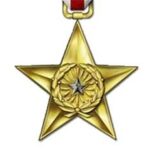 The records below contain the Army recipients of the Silver Star during the Iraq and Afghanistan conflicts, collectively known as the Global War on Terror.
The records below contain the Army recipients of the Silver Star during the Iraq and Afghanistan conflicts, collectively known as the Global War on Terror.
* Indicates Killed in Action (KIA), Missing in Action (MIA), Prisoner of War (POW), or Died Non-Battle (DNB)
![]()


Citation:
The President of the United States takes pleasure in presenting the Silver Star Medal to Ismael Iban, Sergeant First Class, U.S. Army, for conspicuous gallantry and intrepidity in action while serving as the Platoon Sergeant of 3d Platoon, Company C, 52d Infantry Regiment, 2d Infantry Division, during combat operations in support of Operation IRAQI FREEDOM, on 19 February 2007, in Iraq. Sergeant First Class Iban's gallant actions are in keeping with the finest traditions of military heroism and reflect distinct credit upon himself, this Command, and the United States Army.
NARRATIVE TO ACCOMPANY AWARD:
Sergeant First Class Ismael Iban heroically distinguished himself by exceptionally valorous conduct in the face of the enemy of the United States as the Platoon Leader of 3d Platoon, Company C, 52d Infantry Regiment, 2d Infantry Division, during Operation IRAQI FREEDOM. On 19 February 2007, the Tarmiya JSS, located near Taji, Iraq, was destroyed by an S/VBIED that penetrated the perimeter. 3d Platoon, Company C, 52d Infantry Regiment was in sector approximately 10 km away when a radio transmission from D/2-8 CAV requested immediate support. Without fully comprehending the complexity of the situation, Sergeant First Class Iban ordered his platoon to respond to the Tarmiya JSS. As the platoon entered the outskirts of Tarmiya, they were immediately engaged with enemy small arms fire and rocket propelled grenades from nearby alleys and rooftops. Recognizing that his platoon was the first to respond and the only element in proximity, Sergeant First Class Iban made the decision to lead his platoon through the initial enemy contact and continue movement to the JSS. Observing the chaos in the distance created by a nearly rubbled JSS, engulfed in flames and smoke, the platoon continued movement until they encountered significant debris in the road created by the explosion. Unable to continue mounted, Sergeant First Class Iban with four platoon members dismounted their Strykers and rapidly moved over 75 meters under constant enemy automatic fire impacting around them. Upon arrival at the JSS, Sergeant First Class Iban quickly assessed the situation and established command and control. Conducting initial triage, Sergeant First Class Iban and his men began the necessary prep work that would result in the successful MEDEVAC of over 21 American WIA. Simultaneous to the triage of casualties at the JSS, 3d Platoon Stryker Crews worked under enemy fire to create a lane in the road, clearing debris to allow them to establish a defensive perimeter around the JSS. Upon arrival at the JSS, Sergeant First Class Iban loaded the worst of the casualties onto his vehicle and began the 500 meter movement with his platoon to a nearby HLZ )Helicopter Landing Zone.) Upon arrival at the HLZ, the platoon was hit be a complex attack, simultaneously engaged by seven RPG's and multiple enemy machine gun positions from multiple buildings and the wood line approximately 300 meters away. Immediately ordering his platoon to establish a perimeter to secure the HLZ and engage enemy targets of opportunity, Sergeant First Class Iban, without regard for his own life or safety, dismounted his vehicle with his air guard to provide additional suppressive fire as four MEDEVAC helicopters approached. Maneuvering dismounted with nine critically wounded Soldiers under constant enemy fire, the litter teams bounded 100 meters from the cover of Strykers into the open area to the helicopters as rounds impacted within feet of their position. Sergeant First Class Iban and his litter teams successfully loaded the nine casualties onto the helicopters and moved back to the cover of the Strykers. 3d Platoon, under the leadership of Sergeant First Class Iban, repeated this process several times under intense enemy fire until all 21 American WIA were successfully evacuated from the Tarmiya JSS. Sergeant First Class Iban's steadfast leadership and dauntless presence was instrumental in leading his 12-man platoon to overcome incredible odds presented by the enemy. With absolute decisiveness, calmness under pressure, and personal courage, Sergeant First Class Iban's performance on 19 February 2007 directly contributed to saving of his fellow Soldiers' lives in Tarmiya, Iraq. His actions are in keeping with the finest traditions of military heroism and reflect distinct credit upon himself, this Command, and the United States Army.


Synopsis:
The President of the United States takes pleasure in presenting the Silver Star Medal to Norman Inch, Sergeant, U.S. Army, for conspicuous gallantry and intrepidity in action while serving with the 111th Sapper Company, 1st Engineer Battalion, 1st Brigade Combat Team, 1st Infantry Division, during combat operations in support of Operation IRAQI FREEDOM, in Iraq. Sergeant Inch, a combat engineer, was conducting a routine route clearance mission when an improvised explosive device struck another vehicle in his patrol wounding four of his comrades and leaving them trapped inside the vehicle. Without hesitation, Sergeant Inch and his team dismounted from their vehicle, exposing themselves to enemy fire, as they moved to the disabled vehicle to provide aid to the wounded Soldiers. Faced with continuous small arms fire and the threat of around 30 armed insurgents approaching their location, Sergeant Inch instructed his team to return fire at the approaching enemy, killing several of them. Upon arriving at the destroyed vehicle, Inch used his back to hold the heavily-armored, 300-pound door open for nearly 20 minutes as the four wounded Soldiers were removed and carried to a protected area. Sergeant Inch remained vigilant and continued to fire his weapon against approaching enemy forces despite the precarious position of the destroyed vehicle, continual exposure to enemy fire and his own physical efforts to keep the door open.
Home Town: Hutchinson, Kansas


Synopsis:
The President of the United States takes pleasure in presenting the Silver Star Medal to Jeff Ingram, Lieutenant Colonel (Armor), U.S. Army, for conspicuous gallantry and intrepidity in action while serving as Commanding Officer of 2d Battalion, 70th Armored Regiment, 1st Infantry Division, during combat operations in support of Operation IRAQI FREEDOM, on 31 March 2003, in Iraq. During the battle to secure Al Hillah, Iraq, on 31 March 2003, Lieutenant Colonel Ingram's unit, attached 101st Airborne Division, was moving on the city to divert the enemy's attention from the 3rd Infantry Division so they could move forward to Karbala. Colonel Ingram's unit encountered dismounted forces and artillery and rocket propelled grenades from a Republican Guard battalion. Colonel Ingram calmly and skillfully directed the efforts of a combined arms task force in destroying the Iraqi battalion as multiple rocket propelled grenades bounced off his tank, massed artillery fire exploded all around and intense small arms fire was directed at him.
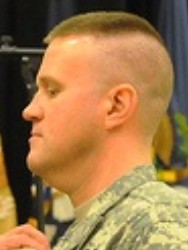

Citation:
The President of the United States of America, authorized by Act of Congress July 9, 1918 (amended by an act of July 25, 1963), takes pleasure in presenting the Silver Star to First Lieutenant Shannon D. Ison, United States Army, for gallantry in action on 16 August 2008, during combat operations against an armed enemy of the United States, as platoon leader, Company A, 206th Engineer Battalion, in support of Operation ENDURING FREEDOM. First Lieutenant Ison was responding to a vehicle that had struck an improvised explosive device. While enemy fire was impacting the burning vehicle and around his own, he left the safety of his cover and ran to pull the wounded from the destroyed truck. While he was moving the wounded under enemy small arms fire, a rocket propelled grenade landed near the soldiers, further wounding one of them. First Lieutenant Ison applied medical care to the injured man and then led his platoon in firing on the enemy positions. Without the courageous acts of First Lieutenant Ison, several lives would have been lost. First Lieutenant Ison's distinctive accomplishments are in keeping with the finest traditions of military service and reflect great credit upon himself, the 206th Engineer Battalion, and the United States Army.
Home Town: Morehead, Kentucky


Synopsis :
The President of the United States of America, authorized by Act of Congress July 9, 1918 (amended by an act of July 25, 1963), takes pleasure in presenting the Silver Star to Major Brett G. Jackson, United States Army, for conspicuous gallantry and intrepidity in action against the enemy while serving with U. S. Special Operations Command Aviation, in support of Operation ENDURING FREEDOM in Afghanistan. His gallant actions and dedicated devotion to duty, without regard for his own life, were in keeping with the highest traditions of military service and reflect great credit upon himself, his unit, and the United States Army.


Citation:
The President of the United States takes pleasure in presenting the Silver Star Medal to Petter Jacobsen, Master Sergeant, U.S. Army, for conspicuous gallantry and intrepidity in action while serving with Operational Detachment Alpha 566 (ODA-566), 5th Special Forces Group (Airborne), during combat operations in support of Operation IRAQI FREEDOM, on 28 January 2006, at Najaf, Iraq. Master Sergeant Jacobsen's heroism and bravery under intense enemy fire provided effective and accurate suppressive fire that supported the withdrawal of dismounted Iraqi army scouts, saving their lives. His actions are in keeping with the finest traditions of military heroism and reflect distinct credit upon himself, Special Operations Task Force - Central, and the United States Army.
NARRATIVE TO ACCOMPANY AWARD:
Master Sergeant Petter Jacobsen distinguished himself by gallantry and intrepidity in action while serving with Operational Detachment Alpha 566 (ODA-566), 5th Special Forces Group (Airborne), in combat against enemy forces on 28 January 2006, in support of Operation IRAQI FREEDOM, at Najaf, Iraq. In the early morning hours of January 28th, a small contingent of Iraqi Army Scouts and the An Najaf Police attempted to negotiate with the "Soldiers of Heaven," an extremist militant group that was preparing to assassinate some of the Islamic world's most prominent Shi'a religious leaders, at their compound and, if necessary, detain the leaders. Gunfire erupted as the Iraqi Force approached the compound. Initial fighting was ferocious, as the vastly outnumbered Iraqi Force fought for survival. Although pinned down, with many casualties and half of their vehicles disabled, they continued to inflict heavy casualties on the much larger enemy force. At approximately 0700 hours, the Detachment 566 Commander received an urgent phone call from the Iraqi Army Scouts requesting immediate assistance. While U.S. Special Forces and Iraqi elements were preparing to move to the battle grounds, they received a second phone call. The An Najaf Governor requested the help of both U.S. ground and air combat support against the amassed enemy force. As Detachment 566 arrived on the battlefield, the Iraqi Scouts were isolated and suppressed by the heavy enemy fire. The detachment advanced to support the Iraqi Scouts and immediately received heavy volumes of enemy small arms, machine gun, rocket propelled grenade, and mortar fire. Master Sergeant Jacobsen, observing 15 pinned down Iraqi Scouts, disregarded heavy enemy machine gun fire, dismounted his vehicle, and used a shallow ditch for protection while engaging the enemy. He pounded the enemy's fortified positions with LAW shoulder-launched rockets, forcing them out of their defenses into a less defendable area. As Master Sergeant Jacobsen then moved toward the pinned Iraqi Scouts, enemy reinforcements moved back into the fortified positions and resumed heavy fire. Master Sergeant Jacobsen, again ignoring his own safety, continued to suppress the enemy. His selfless, valorous actions allowed the 15 Iraqi Scouts to withdraw to friendly defensive positions, saving their lives. With the air strikes and arrival of Iraqi re-enforcements the enemy appeared to have been subdued with only pockets of resistance remaining. At this time, Detachment 566, AOB 510, and their Iraqi Forces counterparts, withdrew from the battlefield to refit and reorganize at their base. As these forces left the battlefield, Detachment 563 with their Iraqi Police Counterparts arrived to assist the Iraqi Forces in securing the enemy compound. They were not aware that over 750 fanatical militants remained in the well defended compound awaiting their chance to fight. When Detachment 563 and their Iraqi counterparts advanced on the compound, they were ambushed by a force firing from behind a large berm. The Green Berets responded by assaulting directly into the enemy fire, forcing the enemy back, and occupying the vital defensive position. The enemy fire once again intensified, and a U.S. Army Apache helicopter, supporting the ground troops, was shot down on the far side of the enemy compound away from the U.S. and Iraqi Forces. Detachment 563, facing overwhelming enemy resistance, was fully engaged and unable to secure the downed helicopter crew. With the renewed enemy resistance and a U.S. helicopter down behind enemy lines, Detachment 566, AOB 510, and their Iraqi counterparts returned to the fight. However, the battle was now at an even more intense level than before, and the Green Berets coordinated a massive effort including additional air strikes and re-enforcement by a U.S. Army Stryker battalion. Meanwhile, Detachment 563 continued to repel the enemy force and, with the help of close air support, began to push the enemy back and advance on their positions. Although two of the Green Berets received wounds and several of the Iraqi Soldiers were also wounded, they continued to drive back the enemy. As they secured the first trenches, they identified the level of sophisticated defensive positions the enemy had established. There were trenches behind the berms as far as the team could see. As Detachment 563 fought on, Detachment 566, AOB 510, and the Iraqi Forces were seeking the wreckage of the downed helicopter in hostile territory. The rescue element turned onto a road with a large berm, overlooking their exposed vehicles. Without warning, the enemy attacked from the top of this berm with rocket propelled grenades and machine guns. The Green Berets and Iraqi Forces engaged enemy as close as two meters away along a 300 meter gauntlet of fire. Master Sergeant Jacobsen's vehicle was securing the rear of the column and was completely exposed to enemy machine gun fire. He engaged the enemy with his M240 machine gun, until it was damaged by direct enemy fire. As he transitioned to his M4 rifle he was struck in the helmet and arm by enemy rounds, and his M4 disabled by a third round. Wounded, he drew his pistol and continued to engage the enemy. Although this engagement resulted in the loss of several more Iraqi soldiers and the wounding of several Green Berets, their valiant efforts fended off the massive enemy ambush. Only later was it realized that the rescue element had driven through the heart of the enemy stronghold. The rescue element soon located the helicopter wreckage but was unable to secure it as they were still outnumbered by the enemy. The rescue team held a defensive position as close as they could to the downed helicopter in order to protect it from enemy approach. Once the U.S. Army Stryker battalion arrived, they were able to safely move to the crash site. Although the two-man crew of the Apache had died in the crash, the actions of the rescue element prevented the enemy from seizing the remains of these brave Americans. On the other side of the battlefield, Detachment 563 continued to suppress enemy resistance with their direct fire and firepower from U.S. air support. The enemy was now pinned between the two U.S. and Iraqi elements, and through coordinated air strikes which continued through the night, enemy resistance was broken. In the end, the U.S. and Iraqi forces had sustained casualties, but had killed hundreds of militants and detained over 200 more. This battle decisively destroyed the "Soldiers of Heaven" cult, and thwarted an attempt to assassinate several major Shia religious leaders. The actions of the U.S. and Iraqi Forces on 28 January 2007 prevented an extremist cult from disrupting the Iraqi efforts to rebuild their country.
Personal Awards: Silver Star (War on Terrorism), Purple Heart
JACOBSON, ERIC
Synopsis:
The President of the United States of America, authorized by Act of Congress July 9, 1918 (amended by an act of July 25, 1963), takes pleasure in presenting the Silver Star to Captain Eric Jacobson, United States Army, for conspicuous gallantry and intrepidity in connection with military operations against an armed hostile force while serving with Operational Detachment Alpha 566 (ODA-566), in support of Operation IRAQI FREEDOM in Iraq during the Battle of Najaf on 28 and 29 January 2007. Captain Jacobson distinguished himself over two days of battle. While facing enemy fire, he coordinated the efforts of U.S. Special Operations, Iraqi Counter-Terrorist, U.S. Air Force and Army aircraft, Iraqi army and Iraqi police forces. While under hostile fire from enemy machine gun, rocket propelled grenade, small arms, and mortar fire, Captain fearlessly dismounting and led an assault against a 600-man enemy force in order to allow isolated Iraqi Army scouts to return to friendly lines as he maneuvered the lead vehicle of a ground assault. He soon had to provide cover fire after his vehicle stalled while others tried to pull the truck out of the line of fire. Captain Jacobson's actions helped directly save the lives of fellow soldiers and local political figures. When he was informed that a Najaf deputy governor and intelligence commander were trapped between enemy and friendly forces, Captain Jacobson designated no-fire areas and helped rescue both political figures. He also led a combined ground assault force to recover two pilots after their AH-64 Apache was shot down by enemy fire. On the way to the crash site, the ground assault force encountered heavy enemy fire, and the rear gunner on Captain Jacobson's Humvee was wounded. Captain Jacobson dressed the wound and immediately resumed actions in the battle. He manned a .50 caliber machine gun to provide suppressive fire after the turret gunner was also wounded. Because of numerous casualties, Captain Jacobson developed a ground medical evacuation plan with detachment vehicles serving as the primary mode of transportation. Captain Jacobson's gallant actions and dedicated devotion to duty, without regard for his own life, were in keeping with the highest traditions of military service and reflect great credit upon himself, his unit, and the United States Army.
Home Town: Ironwood, Michigan
JAMES, STUART
Synopsis:
The President of the United States of America, authorized by Act of Congress July 9, 1918 (amended by an act of July 25, 1963), takes pleasure in presenting the Silver Star to Captain Stuart Martin James, United States Army, for conspicuous gallantry and intrepidity in connection with military operations against an armed hostile force while serving with the 2d Brigade Combat Team, 3d Infantry Division, in support of Operation IRAQI FREEDOM during the Battle for Baghdad, Iraq, in April 2003. Captain James' gallant actions and dedicated devotion to duty, without regard for his own life, were in keeping with the highest traditions of military service and reflect great credit upon himself, the 3d Infantry Division, and the United States Army.
Home Town: Wheeling, West Virginia
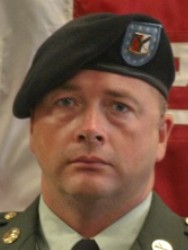

Citation:
The President of the United States of America, authorized by Act of Congress July 9, 1918 (amended by an act of July 25, 1963), takes pride in presenting the Silver Star (Posthumously) to Sergeant First Class Barry E. Jarvis, United States Army, for gallantry in action while serving as the Platoon Sergeant for Second Platoon, Bravo Troop, 1st Squadron, 61st Cavalry Regiment, 101st Airborne Division, on 29 November 2010. Sergeant First Class Jarvis' courage under fire, sacrifice and selfless service reflect great credit upon himself, Bravo Troops, 1st Squadron, 61st Cavalry Regiment, 506th Regimental Combat Team, 101st Airborne Division (Air Assault) and the United States Army. NARRATIVE TO ACCOMPANY AWARD: Sergeant Barry E. Jarvis distinguished himself by extremely valorous service as the Platoon Sergeant for Second Platoon, Bravo Troop, 1-61 Cavalry during Operation ENDURING FREEDOM on 29 November 2010. During a partnered Afghan National Army, Afghan Border Police and U.S. Army patrol, Second Platoon, Bravo Troop was conducting 155-mm. Rocket Assisted Projectile registration from an Afghan Border Police observation post in Pachir Wa Agam District, Nangarhar Province, Afghanistan. As the first artillery round impacted, an Afghan Border Patrolman opened fire on Second Platoon Soldiers observing the registration, instantly killing five U.S. personnel. Upon hearing the shots, Sergeant First Class Jarvis and First Lieutenant Janotka immediately moved toward the sound of the firing. As Sergeant First Class Jarvis came into view of the scene, he realized that both he and the Platoon Leader were in the gunman's life of fire. Sergeant First Class Jarvis immediately pushed First Lieutenant Janotka out of the line of fire, and in doing so, knowingly placed himself in harm's way to prevent his platoon leader from being engaged. As Sergeant First Class Jarvis was turning to engage the gunman, he was mortally wounded. Sergeant First Class Jarvis' courage under fire, selfless service and total disregard for his own safety are in keeping with the finest traditions of military service and reflect great credit upon himself, 1st Squadron, 61st Cavalry Regiment, 101st Airborne Division and the United States Army.
Home Town: Lewisport, Kentucky
JARVIS, BARRY
Synopsis:
The President of the United States of America, authorized by Act of Congress July 9, 1918 (amended by an act of July 25, 1963), takes pleasure in presenting the Silver Star to Specialist Keith A. Jean, United States Army, for conspicuous gallantry and intrepidity in connection with military operations against an armed hostile force while serving in support of Operation ENDURING FREEDOM in Afghanistan. His gallant actions and dedicated devotion to duty, without regard for his own life, were in keeping with the highest traditions of military service and reflect great credit upon himself, his unit, and the United States Army.
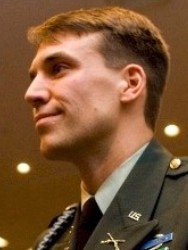

Citation:
The President of the United States of America, authorized by Act of Congress July 9, 1918 (amended by an act of July 25, 1963), takes pleasure in presenting the Silver Star to First Lieutenant (Infantry) Tyler J. Jensen, United States Army, for conspicuous gallantry and intrepidity in action against the enemy as a member of the 19th Special Forces Group, while serving as a Company Embedded Transition Team Mentor with Weapons Company, 3d Kandak, 1st Brigade, 205th Corps, Afghan National Army, in support of Operation ENDURING FREEDMOM in Afghanistan, on 27 January 2007. On that date, his combat reconnaissance patrol was ambushed by an estimated 100 anti-government forces in Sangaar, Uruzgon Province, Afghanistan. First Lieutenant Jensen repeatedly exposed himself to heavy enemy fire in order to rally the Afghan National Army soldiers caught in the kill zone. He braved enemy fire to save a fellow Soldier who was wounded. His courage, superlative combat skills, and tactical leadership under overwhelming direct enemy fire were instrumental in preventing the enemy from overrunning his patrol. First Lieutenant Jensen's heroic actions are in keeping with the finest traditions of the military service, and reflect great credit upon himself, Combined Joint Task Force PHOENIX, and the United States Army.
Home Town: Provo, Utah


Synopsis:
The President of the United States takes pleasure in presenting the Silver Star Medal to Stephan Johns, Sergeant First Class, U.S. Army, for conspicuous gallantry and intrepidity in action while serving as a Special Forces Sniper on a Special Operations Team, during combat operations in support of Operation ENDURING FREEDOM, on 30 May 2004, in Afghanistan. On that date, Sergeant First Class Johns was in the last helicopter of a group mounting an assault on Al Qaeda and Taliban fighters in a valley in northeast Afghanistan. His job was to shoot at the enemy from the air to provide cover to ground forces. When his helicopter was hit and briefly forced down, Sergeant First Class Johns jumped out to set up a one-man defensive wall between a group of enemy fighters and the main American assault group. Alone on the ground for 30 minutes before being picked up by another helicopter, he killed nine enemy fighters who repeatedly rushed him.
Home Town: Pleasantville, New Jersey


Synopsis:
The President of the United States takes pride in presenting the Silver Star Medal (Posthumously) to Allen C. Johnson, Sergeant First Class, U.S. Army, for conspicuous gallantry and intrepidity in action while serving as a Special Forces Medical Sergeant with an Operational Detachment of the 1st Battalion, 7th Special Forces Group (Airborne), during combat operations in support of Operation ENDURING FREEDOM, near Khanaqin, Afghanistan, on 26 April 2005.
Born: at Sun Valley, California
Home Town: Los Molinos, California
Personal Awards: Silver Star (War on Terrorism), Bronze Star, Purple Heart


Synopsis:
The President of the United States of America, authorized by Act of Congress July 9, 1918 (amended by an act of July 25, 1963), takes pleasure in presenting the Silver Star to Staff Sergeant Dillard Jay Johnson, United States Army, for conspicuous gallantry and intrepidity in connection with military operations against an armed hostile force while serving with the 3d Squadron, 7th Cavalry Regiment, 3d Infantry Division, in support of Operation IRAQI FREEDOM at Al Samawa, Iraq in March 2003 Staff Sergeant Johnson's gallant actions and dedicated devotion to duty, without regard for his own life, were in keeping with the highest traditions of military service and reflect great credit upon himself, the 3d Infantry Division, and the United States Army.
Home Town: Louisville, Kentucky
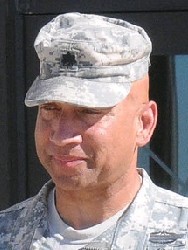

Synopsis:
The President of the United States of America, authorized by Act of Congress July 9, 1918 (amended by an act of July 25, 1963), takes pleasure in presenting the Silver Star to Captain Ronny Anthony Johnson, United States Army, for conspicuous gallantry and intrepidity in connection with military operations against an armed hostile force while serving as Commanding Officer of a Reserve Company, 3d Battalion, 15th Infantry Regiment, 2d Brigade Combat Team, 3d Infantry Division, in support of Operation IRAQI FREEDOM during the Battle for Baghdad on 7 April 2003. Captain Johnson's heroic leadership and dedicated devotion to duty, without regard for his own life, were in keeping with the highest traditions of military service and reflect great credit upon himself, the 3d Infantry Division, and the United States Army.
Home Town: Dallas, Texas


Citation:
The President of the United States takes pleasure in presenting the Silver Star Medal to Thomas H. Johnson, Jr., Captain, U.S. Army, for conspicuous gallantry and intrepidity in action against the enemy while Commanding Troop F, 4th Cavalry Regiment, 1st Infantry Division, during combat operations in support of Operation IRAQI FREEDOM, during the period 10 April 2004 to 24 June 2004, in Iraq. In the face of the enemy, Captain Johnson's personal valor as well as his combat leadership was pivotal to the success of the Brigade reconnaissance troop in multiple engagements. His leadership and relentless attitudes towards the enemy inspired his troops to fight harder and more determined than the enemy thought possible, breaking enemy morale. His actions and leadership are second to none and are in the best traditions of the officer corps. Captain Johnson's exceptional performance is in keeping with the highest traditions of military service and reflects great credit upon himself, Fox Troop, 4th Cavalry Division, 3d Brigade Combat Team, the 1st Infantry Division, and the United States Army.
NARRATIVE TO ACCOMPANY AWARD:
Captain Thomas H. Johnson, Jr., distinguished himself by gallantry in action while Commanding Troop F, 4th Cavalry Regiment, 1st Infantry Division, in support of Operation IRAQI FREEDOM, during the period 10 April 2004 to 24 June 2004, in Iraq. On 10 April 2004, Captain Johnson led two platoons on a dismounted assault of four reinforced enemy positions. After personally supervising the emplacement of a support by fire from F Troop gun trucks and directed well-aimed fires from Kiowa Warriors, tanks, and 155-mm. artillery, Captain Johnson led a 600 meter dismounted assault across an open field and through three irrigation ditches onto the objective. Captain Johnson's valorous actions and leadership that day, led to the destruction of several armed insurgents including one mortar team. On 4 May 2004, Captain Johnson took his Headquarters elements on patrol to check his platoon sector. As he was moving through sectors he monitored a call on the battalion radio that another unit was in contact. He immediately led his Headquarters elements, with only two gun trucks and an FLA, to the scene. Once on scene, he took command of the two separate units and led a dismounted assault. Under enemy fire, Captain Johnson led the assault across 400 meters of open fields and captured 12 insurgents, weapons, and IED materials. Captain Johnson's courageous leadership of F Troop during its intense twelve-hour firefight in Buhriz on 17 June 2004, was instrumental to the BRT's success. Under constant enemy fire, Captain Johnson occupied the most dangerous position on the rooftop of the Troop's strongpoint in order to command and control his Troop. On several occasions he was nearly shot because of his disregard for his own personal safety. His actions and examples allowed his soldiers thirteen confirmed enemy KIAs with zero friendly casualties. From 23 to 24 June 2004, Captain Johnson was tasked with strong pointing the stadium in the city of Ba'qubah. In route to that mission he was informed that he was to turn over his Troop to the Executive Officer and take command of a Mechanized Infantry Company from the 30th Enhanced Brigade, which had lost their commander that morning. Quickly organizing the new command, he led an assault into the Northern portion of the city. Neutralizing small pockets of resistance in house-to-house fighting, he personally led his men in the pacification of the sector. Captain Johnson's exceptional performance is in keeping with the highest traditions of military service and reflects great credit upon himself, Fox Troop, 4th Cavalry Division, 3d Brigade Combat Team, the 1st Infantry Division, and the United States Army.
Home Town: Atlanta, Georgia
Personal Awards: Silver Star (War on Terrorism), 4@ Army Commendation Medals
JONES, BENJAMIN
Synopsis:
The President of the United States takes pleasure in presenting the Silver Star Medal to Benjamin Jones, Sergeant First Class, U.S. Army, for conspicuous gallantry and intrepidity in action while serving as a Senior Weapons Sergeant with Operational Detachment Alpha 344 (ODA-344), Company A, 2d Battalion, 3d Special Forces Group (Airborne), in action against enemy forces in support of Operation ENDURING FREEDOM, in Afghanistan.
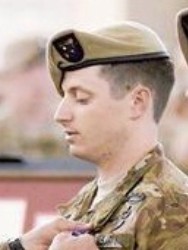

Citation:
The President of the United States of America, authorized by Act of Congress July 9, 1918 (amended by an act of July 25, 1963), takes pleasure in presenting the Silver Star to Staff Sergeant James B. Jones, United States Army, for gallantry in action as a Ranger Squad Leader in Company B, 1st Battalion, 75th Ranger Regiment,, for a Joint Task Force in support of Operation ENDURING FREEDOM in Afghanistan, on 2 December 2014. During this period, Staff Sergeant Jones maneuvered on multiple enemy fighting positions over a sustained six hour direct fire engagement, resulting in over 25 enemy combatants killed. With no regard to personal safety, Staff Sergeant Jones placed himself in direct fire and imminent danger in order to move a wounded Ranger behind cover. Staff Sergeant Jones undoubtedly saved the lives of numerous Rangers and directly contributed to the success of the Joint Task Force. Through his distinctive accomplishments, Staff Sergeant Jones reflected great credit upon himself, this Command, and the United States Army. NARRATIVE TO ACCOMPANY AWARD: Staff Sergeant James B. Jones distinguished himself through conspicuous gallantry and intrepidity on 2 December 2014 as a Ranger Squad Leader while deployed to Afghanistan in support of Operation ENDURING FREEDOM. On 2 December 2014, Staff Sergeant Jones was a Ranger Squad Leader for a Joint Task Force tasked with executing an objective in Nangahar Province, Afghanistan. After execution of the first targeted compound, the Assault Force (AF) moved to clear an assessed media center approximately two kilometers away. During movement to the follow on objective, Staff Sergeant Jones' element was engaged by two enemy combatants armed with AK-47's from a distance of 30 feet. Staff Sergeant Jones immediately returned fire and oriented the Ktah Kas Afghan (KKA) Special Operation soldiers towards the two combatants. With little regard for personal safety, Staff Sergeant Jones maneuvered under direct fire in order to gain a tactical vantage point. Staff Sergeant Jones then engaged the enemy combatants with fragmentation grenades. He then coordinated with the base of fire element to maneuver behind cover in order to continue movement to the follow on objective. Staff Sergeant Jones' poise while under direct fire directly resulted in two enemy combatants killed and numerous American and KKA Special Operations soldiers' lives saved. While executing an objective, Staff Sergeant Jones was tasked with isolating the follow on targeted compound from enemy influence. Throughout execution, the Assault Force was under direct fire from PKM's, AK-47's, and RPG's. Reports from aerial assets stated there were multiple enemy combatants maneuvering on the Assault Force. During callout of the compound, Staff Sergeant Jones observed four enemy combatants exit a compound to the east and begin to maneuver on the AF. Staff Sergeant Jones immediately engaged and eliminated the combatants. Staff Sergeant Jones' decisive decision making process contributed to the success of the Joint Task Force. Staff Sergeant Jones was a Ranger Squad leader during the execution of an objective. During the callout of one of the targeted compounds, the Assault Force encountered three barricaded shooters. During the ensuing fire fight, one Ranger received a gunshot wound to the left auxiliary pocket and fell into the compound. Without hesitation and with total disregard for personal safety, Staff Sergeant Jones entered the compound while under direct fire and dragged the injured Ranger outside the compound and behind cover. Staff Sergeant Jones then assisted in the treatment and evacuation of the wounded Ranger. His efforts directly resulted in an extremely timely evacuation and ultimately saved the life of the casualty. Staff Sergeant Jones then moved under PKM fire to orient his Gustav Team towards the barricaded shooter and directed three accurately placed shots into the side of the targeted compound. Staff Sergeant Jones' actions throughout the operation contributed to over 25 enemy combatants killed and the preservation of 49 Joint Special Operations soldiers. Through his distinctive accomplishments, Staff Sergeant Jones' actions were exceptional and reflect great credit upon himself, his unit, and the Department of Defense.
Home Town: Swansboro, North Carolina
JORDAN, PATRICK
Synopsis:
The President of the United States takes pleasure in presenting the Silver Star Medal to Patrick Jordan, Sergeant, U.S. Army, for conspicuous gallantry and intrepidity in action while serving with Company C, 2d Battalion, 37th Armored Regiment, 1st Armored Division, in action against the enemy in support of Operation IRAQI FREEDOM on 4 April 2004, in Iraq. On that date, Sergeant Jordan ignored heavy enemy fire from small arms and rocket propelled grenades to help rescue 20 soldiers pinned down in a Baghdad ally. When one Humvee broke down under heavy enemy fire, by quick thinking Sergeant Jordan was able to save his comrades. During the four-hour convoy, Sergeant Jordan bravely stuck his head out of the hatch of his tank, firing more than 400 rounds and killing or wounding between 20 and 30 insurgent enemy troops.
Born: at Des Moines, Iowa
Home Town: Des Moines, Iowa


Citation:
The President of the United States takes pleasure in presenting the Silver Star Medal to Joshua V. Joseph, Private First Class, U.S. Army, for conspicuous gallantry and intrepidity in action while serving with the 2d Battalion, 1st Infantry Regiment, 172d Stryker Brigade Combat team, at Mosul, Iraq, on 19 November 2005, during military operations in support of Operation IRAQI FREEDOM III. Private First Class Joseph's courage and disregard for his own welfare resulted in saving the lives of his fellow comrades who were severely wounded. His bravery is in keeping with the highest traditions of military heroism and reflect distinct credit upon himself, his unit, the United States Army, and the United States of America.
Home Town: Indianapolis, Indiana


Synopsis:
The President of the United States takes pleasure in presenting the Silver Star Medal to Matthew Julian, Sergeant First Class, U.S. Army, for conspicuous gallantry and intrepidity in action while serving with the 1st Battalion, 3d Special Forces Group (Airborne), during combat operations in support of Operation ENDURING FREEDOM, in Oruzgan Province of Afghanistan, in October 2005. Sergeant First Class Julian and his team had been conducting cordon and search operations in a valley known to be a Taliban sanctuary when his team was attacked. Sergeant First Class Julian jumped out of his vehicle and started firing a 60 mm mortar at the enemies. When enemy fire increased, he began firing shells to the north and made other tactical maneuvers that helped save his detachment.

